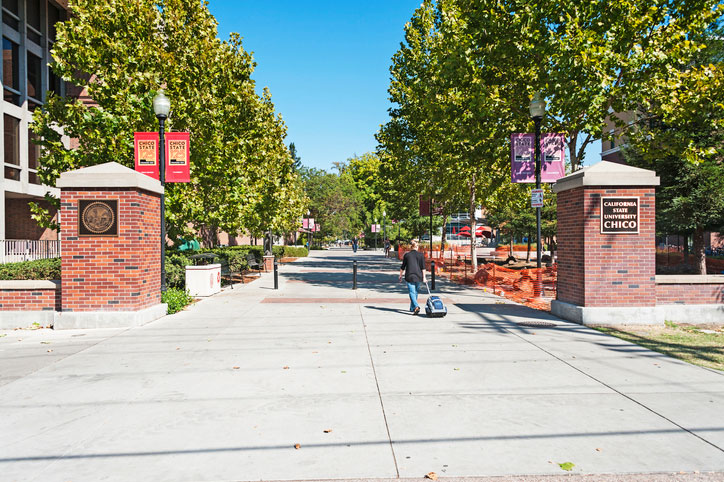California ranks among the top 3 states for social worker employment across all specializations, with median salaries exceeding national averages by 15-25%.
Quick Navigation

According to 2024 Bureau of Labor Statistics data, California employs over 35,000 social workers across various settings, including child and family services, healthcare, mental health and substance abuse treatment, and specialized practice areas. This robust job market, combined with California’s progressive social policies, makes the state an ideal location to begin your social work education.
Top CSWE-Accredited BSW Programs in California
California’s BSW programs vary significantly in format, cost, and specialization options. The following comprehensive table includes all currently accredited programs, helping you compare options based on your priorities and circumstances.
| University | Location | Format Options | Annual Tuition (In-State) | Program Highlights |
|---|---|---|---|---|
| California State University, Chico | Chico | Hybrid/Online | $7,500-$8,000 | 3-year accelerated option, weekend intensives, 18 county field placements |
| San Diego State University | San Diego | Campus | $7,500-$8,000 | Border studies emphasis, bilingual options, strong research focus |
| UCLA | Los Angeles | Campus | $13,000-$14,000 | Research opportunities, urban practice focus, prestigious faculty |
| CSU Long Beach | Long Beach | Campus/Hybrid | $7,000-$7,500 | Community partnerships, diverse field placements, evening options |
| Humboldt State University | Arcata | Campus/Online | $7,500-$8,000 | Rural practice emphasis, Indigenous communities focus, environmental justice |
| CSU Sacramento | Sacramento | Campus | $7,000-$7,500 | Policy practice emphasis, state government internships, Title IV-E program |
| University of Southern California | Los Angeles | Campus | $62,000-$65,000 | Extensive alum network, innovative curriculum, global opportunities |
| CSU Fresno | Fresno | Campus | $7,000-$7,500 | Central Valley focus, agricultural communities, Spanish-language track |
One of the most significant advantages of earning your BSW in California is eligibility for Advanced Standing MSW programs, allowing you to complete your master’s degree in just one year.
Online BSW Programs in California
For students balancing work, family, or geographic constraints, California offers several fully online and hybrid BSW options. These programs maintain the same CSWE accreditation standards as traditional programs while providing flexibility for diverse learners.
California State University, Chico – Distance Education BSW
CSU Chico’s innovative 3-year, year-round program combines online coursework with weekend intensives, making it California’s most popular distance BSW option. Students complete asynchronous online modules during the week and attend two weekend sessions per semester on campus or at regional sites.
Program features include:
- Accelerated timeline, reducing time to degree by 25%
- Field placements available in 18 California counties
- Cohort model fostering peer support and networking
- Same faculty and curriculum as the campus program
- Financial aid and scholarship eligibility
Interested in exploring more online options? View our comprehensive guide to online BSW programs nationwide to compare California programs with other distance learning opportunities.
Brandman University (now UMass Global)
UMass Global offers an entirely online BSW program with no campus visits required, making it ideal for students outside major metropolitan areas. The program features eight-week courses, multiple start dates annually, and competency-based options for working professionals.
Humboldt State University (now Cal Poly Humboldt)
Cal Poly Humboldt’s hybrid BSW program combines online learning with intensive campus experiences, emphasizing rural and Indigenous community practice. Students attend three on-campus sessions per year while completing coursework online.

Campus-Based BSW Programs
Traditional campus programs offer immersive experiences with face-to-face instruction, on-campus resources, and immediate peer interaction. California’s diverse geography offers campus settings ranging from urban Los Angeles to rural Humboldt County, each providing unique learning environments and community partnerships.
Urban Campus Programs
Metropolitan programs in Los Angeles, San Francisco, and San Diego provide:
- Diverse field placement opportunities in hospitals, schools, and agencies
- Exposure to multicultural populations and urban social issues
- Public transportation access to internship sites
- Networking with primary healthcare and social service systems
- Specialization in areas like homelessness, immigration, and criminal justice
Rural and Regional Programs
Programs in areas like Humboldt, Chico, and Fresno offer:
- Focus on rural practice challenges and solutions
- Smaller class sizes and personalized attention
- Community-embedded learning experiences
- Lower cost of living during studies
- Preparation for underserved area practice
Tuition Costs and Financial Aid
The costs of the California BSW program vary significantly between public and private institutions. Understanding the complete financial picture helps inform your educational investment.
Cost Breakdown by Institution Type
| Institution Type | Annual Tuition Range | Total Program Cost (4 years) | Financial Aid Options |
|---|---|---|---|
| CSU System | $7,000-$8,500 | $28,000-$34,000 | Cal Grant, Pell Grant, State University Grant |
| UC System | $13,000-$15,000 | $52,000-$60,000 | Blue & Gold Opportunity, Cal Grant, UC Grants |
| Private Universities | $45,000-$65,000 | $180,000-$260,000 | Institutional aid, merit scholarships, need-based grants |
| Online Programs | $8,000-$25,000 | $32,000-$100,000 | Federal aid, employer tuition assistance, military benefits |
California-Specific Financial Aid
California residents benefit from state-specific aid programs:
- Cal Grant A & B: Up to $12,570 annually for eligible students
- Middle Class Scholarship: Covers 10-40% of CSU/UC tuition
- Student Success Completion Grant: Additional $2,000-$4,000 for full-time students
- Title IV-E Stipends: Up to $18,500 annually for child welfare specialization
- Mental Health Services Act Stipends: Funding for mental health track students
Admission Requirements
While requirements vary by institution, California BSW programs typically expect:
Academic Prerequisites
- High school diploma or GED
- Minimum GPA of 2.5-3.0 (varies by program competitiveness)
- Completion of general education requirements, including:
- English composition (2 semesters)
- Social sciences (psychology, sociology, anthropology)
- Biology or human development
- Statistics or research methods
- For transfers: 60 transferable semester units
Application Components
- Personal statement addressing motivation for social work
- 2-3 letters of recommendation
- Resume highlighting relevant experience
- Criminal background check clearance
- Some programs: volunteer/work experience in human services
Special Considerations
Many California programs offer priority admission for:
- First-generation college students
- Veterans and military families
- Bilingual applicants (especially Spanish speakers)
- Students from underrepresented communities
- California community college transfers with ADT degrees
Career Outlook and Salary Expectations
California’s robust social services sector offers excellent career prospects for BSW graduates. According to 2024 BLS data, California social workers earn median salaries 20-25% above the national average, reflecting both the higher cost of living and strong demand for qualified professionals.
California Social Worker Salary Ranges by Specialization (2024)
| Specialization | Entry Level (BSW) | Median | Experienced (10+ years) | Job Growth |
|---|---|---|---|---|
| Child & Family Services | $48,000-$55,000 | $68,500 | $85,000-$95,000 | +12% |
| Healthcare Social Work | $52,000-$58,000 | $75,000 | $92,000-$105,000 | +14% |
| Mental Health & Substance Abuse | $45,000-$52,000 | $65,000 | $80,000-$90,000 | +18% |
| School Social Work | $50,000-$56,000 | $72,000 | $88,000-$98,000 | +10% |
Top California Employers for BSW Graduates
Major employers actively recruiting BSW graduates include:
- Kaiser Permanente (healthcare social work)
- Los Angeles County Department of Children and Family Services
- California Department of Social Services
- San Francisco Human Services Agency
- UC and CSU medical centers
- Veterans Affairs facilities statewide
- Large school districts (LAUSD, San Diego Unified, Fresno Unified)
- Community mental health centers
California Social Work Licensing Path
Understanding California’s licensing structure helps BSW students plan their career progression. California offers the Licensed Bachelor Social Worker (LBSW) credential for BSW graduates, though it’s not required for all positions.
LBSW Requirements in California
- Graduated from a CSWE-accredited BSW program
- Pass the ASWB Bachelor’s examination
- Complete criminal background check
- Apply to the California Board of Behavioral Science
- No supervised experience required for initial licensure
Career Advancement Path
Many BSW graduates pursue advanced education for expanded opportunities:
- BSW → MSW: Eligible for Advanced Standing programs (1 year)
- MSW → LCSW: Clinical licensure after 3,000 supervised hours
- Alternative paths: Some pursue MSW programs without a BSW if changing careers
Planning to continue your education? California offers excellent MSW programs with Advanced Standing options for BSW graduates.

Field Education and Internship Opportunities
Field education represents the signature pedagogy of social work education, providing hands-on experience essential for professional development. California BSW programs typically require 400-500 hours of supervised field placement, which is usually completed during the final year.
Types of Field Placements
California’s diverse communities offer varied placement settings:
- Urban placements: County welfare departments, hospitals, schools, homeless services
- Rural placements: Tribal health centers, agricultural worker programs, rural clinics
- Specialized settings: Immigration services, LGBTQ+ centers, veteran programs
- Innovative placements: Tech companies (employee assistance), entertainment industry support services
Title IV-E Child Welfare Program
Several California BSW programs participate in Title IV-E partnerships, providing:
- Specialized child welfare curriculum
- Stipends up to $18,500 annually
- Guaranteed placement in child welfare agencies
- Employment commitment in public child welfare (typically 2 years)
- Fast-track to supervisory positions
Choosing the Right California BSW Program
Selecting among California’s many BSW options requires careful consideration of multiple factors:
Location Considerations
- Cost of living: Varies dramatically (San Francisco vs. Fresno)
- Field placement availability: Urban areas offer more variety
- Community connections: Consider where you plan to practice
- Support systems: Family, friends, cultural communities
Program Format Decision
- Traditional campus: Best for recent high school graduates seeking a whole college experience
- Online/hybrid: Ideal for working adults, parents, or those in remote areas
- Accelerated options: Perfect for motivated students wanting faster completion
- Part-time programs: Allow continuation of employment during studies
Specialization Opportunities
While BSW programs provide generalist training, some California programs offer concentrations:
- Child welfare and family services
- Gerontological social work
- School social work preparation
- Health and mental health
- Community organization and advocacy
- International social work
Frequently Asked Questions
How long does it take to complete a BSW in California?
Most California BSW programs require 120 semester units, which are typically completed in four years of full-time study. However, CSU Chico offers a 3-year accelerated option, and part-time programs may take 5-6 years. Transfer students with an Associate Degree for Transfer (ADT) can often complete their BSW in 2 years.
What GPA is required for California BSW programs?
Minimum GPA requirements vary by institution. CSU campuses typically require a 2.5-3.0 GPA for admission, while UC schools generally expect 3.0 or higher. Competitive programs like UCLA or USC often admit students with 3.5+ GPAs. Community college transfers may have different GPA requirements through guaranteed admission programs.
Can I work while completing my BSW in California?
Yes, many students work while pursuing their BSW. Online and hybrid programs offer maximum flexibility for working students. However, field placement requirements (16-20 hours weekly) during your final year may limit work availability. Some programs offer evening and weekend field placements to accommodate working students.
Is CSWE accreditation important for California BSW programs?
CSWE accreditation is essential. Only graduates from CSWE-accredited programs can pursue licensure, qualify for Advanced Standing MSW programs, and meet employment requirements at many agencies. All programs listed in this guide are currently accredited by the CSWE. Always verify accreditation status on the CSWE website before enrolling.
What’s the average cost of a BSW in California?
California State University campuses charge approximately $7,000 to $8,500 annually for in-state students, totaling $28,000 to $34,000 for a four-year degree. UC schools cost $13,000 to $15,000 per year. Private universities typically range from $45,000 to $65,000 annually. Financial aid normally reduces these costs significantly, with many CSU students paying less than $5,000 per year after aid.
Do I need field placement hours for my BSW?
Yes, all CSWE-accredited BSW programs require a minimum of 400 hours of supervised field education. California programs typically require 450-500 hours, completed over two semesters during your senior year. Your program arranges field placements and includes weekly supervision by licensed social workers.
Next Steps Toward Your California BSW
Starting your social work education in California positions you for a rewarding career in one of the nation’s most progressive states for social services. Whether you choose the innovative online program at CSU Chico, a prestigious urban campus in Los Angeles, or a community-focused program in the Central Valley, California’s BSW programs provide excellent preparation for professional practice.
Ready to explore specific programs? Start by:
- Reviewing our comprehensive guide to BSW degree programs nationwide
- Requesting information from your top 3-5 California programs
- Attending virtual information sessions offered by schools
- Connecting with current students or alums through program websites
- Visiting campuses, if possible, to get a feel for the environment
California’s commitment to social justice, diverse populations, and progressive policies creates an ideal environment for social work education and practice. With careful program selection and dedication to your studies, your California BSW will launch a meaningful career serving communities throughout the Golden State and beyond.
2024 US Bureau of Labor Statistics salary and employment data for Child, Family, and School Social Workers, Healthcare Social Workers, Mental Health and Substance Abuse Social Workers, and Social Workers, All Other reflect state data, not school-specific information. Conditions in your area may vary. Data accessed August 2025.














